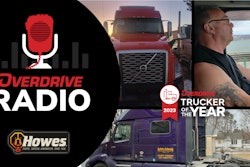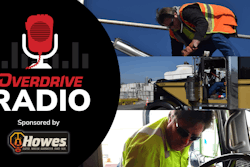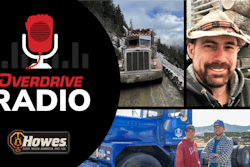There remains a stigma associated with mental health that can prevent many from getting effective help. That's among the messages that my colleague and Overdrive Extra contributor/longtime hauler Clifford Petersen communicates in today's special-edition Monday Overdrive Radio podcast -- apologies to all who were expecting our usual Friday drop. The last couple weeks have been a bit heavy for several of us here at Overdrive, since learning of the passing of an operator we knew who took his own life. It's a difficult subject to know how to approach, to communicate. Petersen is among us the best suited to speaking with authority on the broader issues. In the podcast, I dive in with him to talk through his journey to where he is today, with a mission to be a lifeline of support specifically to those who, like him, work over-the-road and struggle with anxiety, depression, in his case PTSD, and/or a myriad other issues. Petersen's trained in substance-abuse counseling, life coaching broadly, and a variety of psychological diagnoses and techniques.
There's some good news in all of this today, too, with signs that, both inside and outside trucking, attitudes around mental health are changing for the better. Look no farther than the struggles of Pennsylvania Senator John Fetterman, who took the dramatic step of seeking in-patient treatment for depression last week and was quite open with the public about it. Around trucking, there's the new training course in mental health from CarriersEdge. That company's CEO, Jane Jazrawy, told me last week that she's "wanted to write the course for a long time." Among reasons are a desire to bust up the stigma around mental health, but there's plenty in the way of practical concerns for operators and trucking companies there, too.

As Petersen makes note of in the podcast, trucking companies can be on the front lines of support for operators, of course, and Jazrawy hopes CarriersEdge subscriber fleets, and their back-office employees and operators, will take advantage of the course. She noted a question her organization asks in its surveying of fleets that are part of the evaluation for its well-known Best Fleets to Drive For recognition program. It's a question related to post-accident procedure. Fewer than 20% say they actually ask how the driver is in the initial post-crash conversation. "They go immediately to who’s at fault," Jazrawy said. "You have to consider that. But you also have a person on the road who’s been in a collision. ... Put the person first."
Jazrawy emphasized the importance not only of action but policy at trucking companies of all sizes. "I think it’s really important fleets think about what they’re saying in their policy," she said. "Are you going to start by making sure everybody’s OK" post-accident? "And not just doing it, but making sure you tell people that it should be automatic when someone gets in a collision. 'How are you feeling? Do you need a minute?'"
 Overdrive Radio sponsor Howes is offering a prize pack including its Lifeline fuel treatment and Howes Multipurpose penetrating oil to those who send me an an email or leave a voicemail on the podcast message line. Leave your name and address and we'll get it to your doorstep: 615-852-8530.
Overdrive Radio sponsor Howes is offering a prize pack including its Lifeline fuel treatment and Howes Multipurpose penetrating oil to those who send me an an email or leave a voicemail on the podcast message line. Leave your name and address and we'll get it to your doorstep: 615-852-8530.
Sometimes, he notes, all a person really needs is a willing ear on the phone or video chat. As he's written in varying degrees of detail in Overdrive before, his journey to realizing his driver-support mission has been a long one. And to anyone who's ever felt like they were truly at the end of the the rope, as it were, as he wrote last week, "you are not alone ... Truckers need to know they're not alone. ... We are your community, and we are here, willing to help. You can always call me at 573-730-2370. I still truck, and I still work with truckers -- and I’ll never charge you a dime. I’m here to help.” Hear his story in the podcast:
Petersen also notes road chaplain organizations, staffed by people with willing ears in his experience, and free of judgment, including Truckstop Ministries and the organization he's a part of himself, Channel 21 Ministries. (There's also the 988 national crisis hotline, which is staffed for both calls and texts 24/7.)
The CarriersEdge course, fundamentally, is less about putting folks through any kind of therapy session and more an "understanding-the-situation tool," said Jazrawy. The more trucking personnel all across organizations large and small take it, the more will be "able to recognize a situation when it happens," whether it's happening directly to you or to a colleague or close personal friend.
[Related: Burnout: How to recognize it's stoking and steer yourself toward greener pastures]
Petersen's own writing these last several years here at Overdrive, has touched on a myriad of topics, lending the benefit of his post-graduate education in techniques, some of which he's used himself in ongoing efforts to battle his own demons since the PTSD diagnosis sent him down the path of mental health education almost two decades ago now. A lot of what he’s written around the subject he thinks of as a set of "tools that a person can put in their toolbox to help them out. ... The trucker knows what it means to have the right tool for the right job. If you're having an issue, get the right tool and use it. Life is the same thing. Get the right tool, and use it."
Petersen's story is one I hope anyone listening will see as proof that, yes, though the road might well be a tough one looking ahead, there is hope, if we all do our best to truly support each other. Petersen’s still here, still trucking, and his mission is clear evidence of that.
[Related: Drivers convoy after trucking family teen's tragic death]










